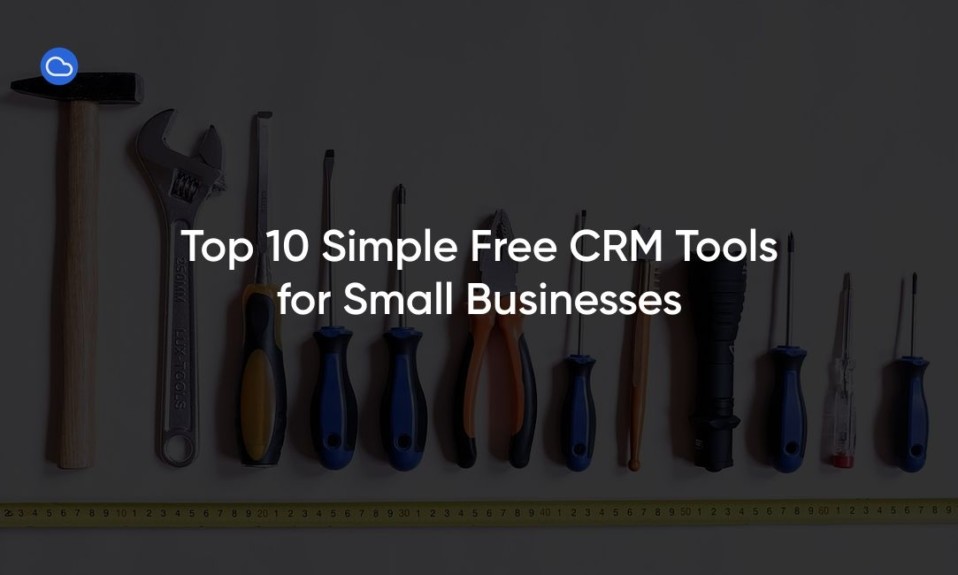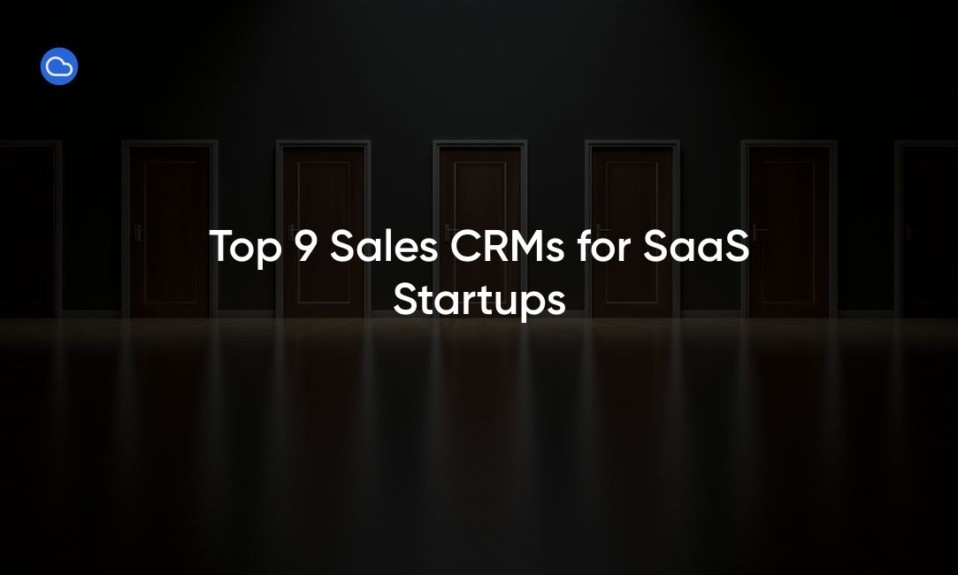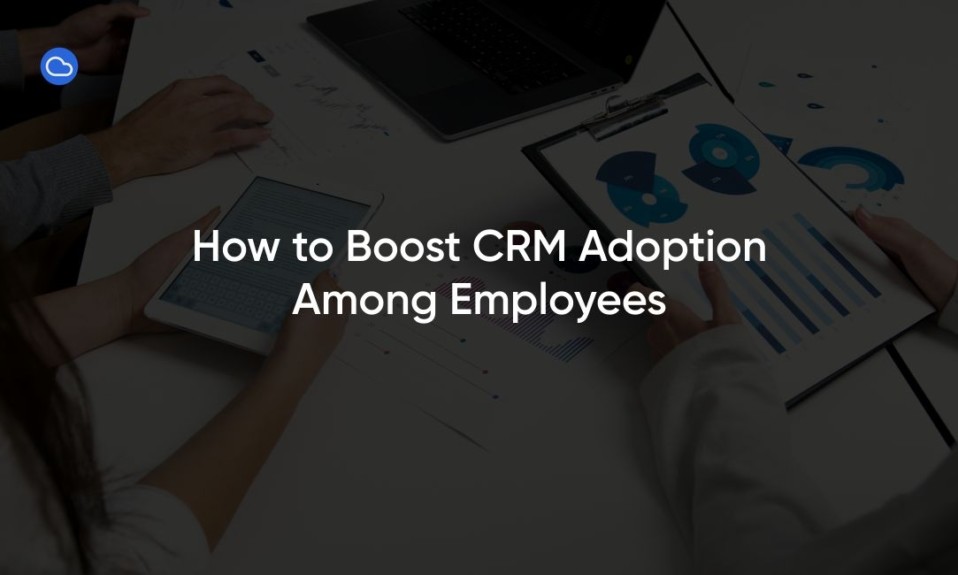Juggling customer data across spreadsheets and sticky notes?
Small businesses need a simple CRM solution that doesn’t require IT expertise or endless training sessions (we’ve all seen those overly complex systems).
The right free tools can organize contacts, track deals, and automate follow-ups while leaving room to focus on actual growth.
This guide compares 2025’s top free CRMs specifically designed for small teams, breaking down their core features, limitations, and ideal use cases.
You’ll discover which platforms balance essential functionality with true simplicity, plus learn how to avoid common pitfalls when implementing your first CRM.
Why Small Businesses Need CRM Software
Customer Relationship Management (CRM) software plays an essential role in the growth and success of small businesses.
It helps you organize customer data effectively, which saves time and enhances efficiency.
I’ve watched numerous small teams transform their operations after implementing even basic CRM solutions.
With a CRM, your team can streamline daily workflows in ways sticky notes just can’t match.
Imagine having all customer interactions tracked in one place—no more digging through email threads or asking colleagues “did anyone follow up with that lead?”
This centralized approach empowers everyone to respond promptly, dramatically improving customer satisfaction.
Many small businesses struggle with maintaining consistent customer relationships.
A good CRM system addresses this challenge by providing valuable insights into customer behavior.
These insights lead to more targeted marketing strategies that actually connect with your audience.
Your business becomes more adaptable, responding to customer needs rather than guessing what might work.
-
Track all customer communications in one place
-
Automate follow-up reminders
-
Identify your most valuable customers
-
Spot sales opportunities you might otherwise miss
Even the smallest teams are now expected to deliver personalized experiences.
A user-friendly CRM can be the difference between building lasting client relationships and watching potential customers drift away to competitors.
Trust me—investing in simple CRM solutions can completely transform how you engage with customers, creating the foundation for sustainable growth.
Key Features to Look for in a Small Business CRM
Choosing a CRM for your small business requires careful consideration of specific features that deliver value right from the start.
A simple CRM for small business should prioritize usability, affordability, and essential functionalities without overwhelming your team.
First things first—look for a user-friendly interface.
A clean, intuitive design allows your team to navigate the platform effortlessly without extensive training.
Nobody wants to waste precious hours figuring out complicated systems when they could be connecting with customers.
The best interfaces feel almost invisible, letting you focus on relationships rather than wrestling with software.
Affordability is non-negotiable for small businesses.
You deserve a CRM that aligns with your budget constraints while still delivering core functionality.
Many platforms offer free plans or low-cost options specifically tailored for smaller teams.
This flexibility allows you to test-drive tools without a hefty financial commitment—perfect for startups watching every penny.
|
Essential CRM Feature |
Why It Matters |
|---|---|
|
Contact Management |
Centralizes customer information and interaction history |
|
Lead Tracking |
Monitors potential customers through your sales pipeline |
|
Basic Automation |
Reduces manual tasks like follow-up reminders |
|
Email Integration |
Connects communications directly to customer profiles |
Consider scalability as your business grows.
The right CRM solution should adapt to your changing needs without forcing you to switch platforms later.
Look for systems that offer tiered plans allowing you to add features as needed.
This approach ensures consistent support whether your team adds one new member or ten.
Integration capabilities often get overlooked but can dramatically boost productivity.
A CRM that connects seamlessly with your existing email, calendar, and marketing tools creates a unified workflow.
These connections maximize your team’s effectiveness by eliminating duplicate data entry and providing a complete view of customer interactions.
Finding the best simple CRM solution means identifying features that genuinely support your business goals without unnecessary bells and whistles.
Have you considered which features would make the biggest difference to your daily operations?
How to Choose the Right CRM for Your Small Business
Finding the right CRM can feel like searching for a needle in a digital haystack.
With countless options available, it’s crucial to evaluate them systematically.
Start by considering your business size and structure.
A small team simply doesn’t need the extensive features that enterprise organizations require.
Look for a simple CRM platform that offers just enough functionality without overwhelming complexity.
I’ve seen too many small businesses invest in massive CRM systems only to use a tiny fraction of their capabilities.
That’s just throwing money down the drain!
Next, identify your specific industry needs.
Different businesses have unique requirements that shape their ideal CRM solution.
For example, retail businesses typically prioritize sales pipelines and inventory tracking.
Service-based companies, however, might value relationship management tools and appointment scheduling features.
-
Assess your team’s technical comfort level
-
Consider your typical sales cycle length
-
Identify your most important customer touchpoints
-
Determine which metrics matter most to your business
Be honest about your team’s technical capabilities.
Not everyone on your staff will be equally tech-savvy.
Choose a CRM featuring an intuitive interface that won’t require weeks of training.
A straightforward design helps everyone adapt quickly, improving adoption rates and overall productivity.
Think about your growth trajectory when selecting a CRM.
The solution that fits perfectly today might become restrictive as you expand.
Look for affordable CRM options that can scale alongside your business without forcing you to migrate to an entirely new system later.
Keep these factors in mind as you explore different CRM solutions for small businesses.
The right choice will enhance your customer relationships and boost operational efficiency without breaking the bank.
And between you and me, investing time in this decision now will save you countless headaches down the road.
Top 10 Free CRM Tools for Small Businesses
HubSpot CRM
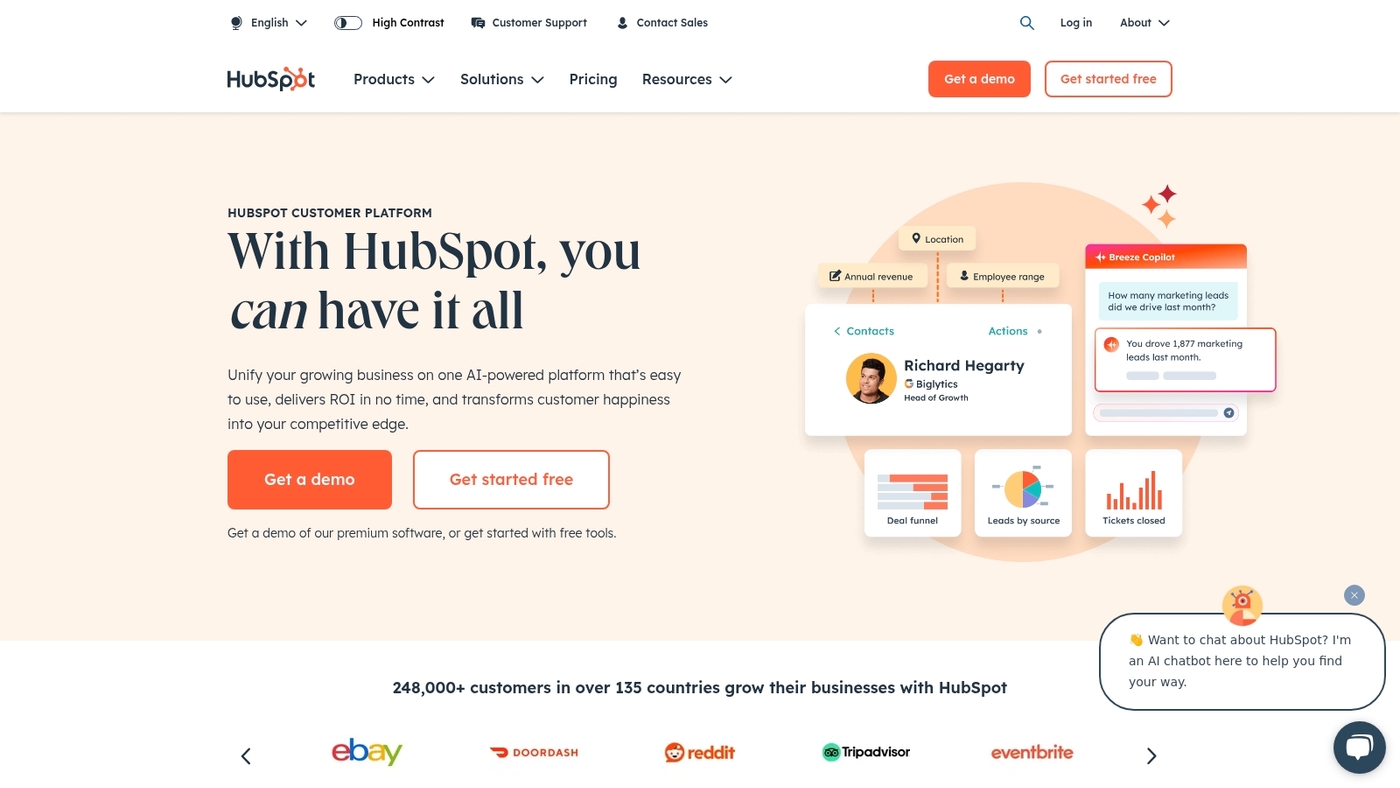
HubSpot CRM offers a robust free plan designed to streamline your customer relationship management.
With unlimited users and contacts, it allows small businesses to effectively manage their customer interactions and sales processes without breaking the bank.
This CRM includes vital features like contact management, deal tracking, and email integration.
An intuitive interface simplifies the user experience, making it accessible even for those without a background in technology.
I’ve been using this software regularly and appreciate how seamless it is to adapt and scale as my needs evolve, especially with its upgrade paths for advanced tools.
Advantages
-
Unlimited users and contacts in the free plan
-
Easy integration with email and marketing tools
-
Visual pipeline management
-
Detailed reporting capabilities
Disadvantages
-
Limited advanced features without an upgrade
-
Learning curve for new users can be steep
-
Email tracking limited to 200 notifications monthly
For who?
HubSpot CRM is an excellent choice for small businesses, startups, and even solo entrepreneurs seeking a simple yet effective way to manage customer relationships and sales processes.
Its user-friendly interface appeals to those without extensive technical expertise.
Price
The basic plan is free, providing essential features, with options to upgrade for more advanced functionalities as the business grows.
Zoho CRM
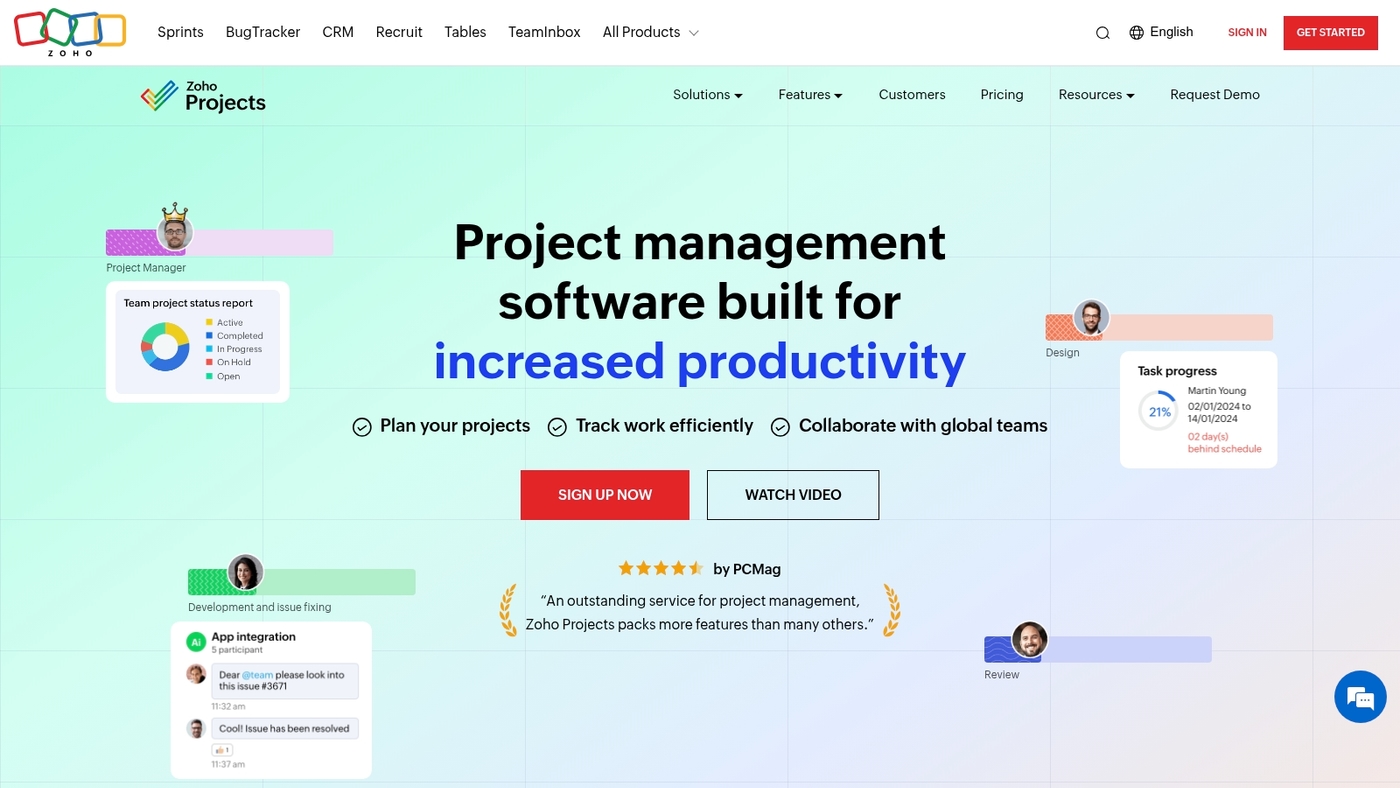
Zoho CRM offers a feature-rich free tier designed specifically for small sales-focused teams.
You can use it for up to three users, which makes it an excellent choice for those just starting out or needing a simple CRM for small business operations.
Key features include lead scoring, workflow rules, and mobile access, which streamline daily activities.
I’ve been using Zoho CRM for my team, and I appreciate how intuitive it feels while offering automation options that save precious time.
Its accessibility on mobile devices ensures your team can stay engaged with customer needs on the go.
This combination of automation and ease of use truly enhances productivity.
Pros
-
Generous free tier for up to three users
-
Feature-rich with lead scoring and workflow automation
-
Mobile access for managing customer relationships on the go
Cons
-
Limited to three users in the free version
-
Some advanced features require a paid plan
-
Can feel overwhelming with its many options
For who?
This CRM is ideal for small teams in sales that want to improve customer relationships without investing heavily in software.
It’s particularly useful for startups and growing businesses that value automation and simple interfaces.
Pricing
The free tier allows three users and offers essential features. Paid plans are available for larger teams, enhancing functionality as your business grows.
Freshworks CRM
Freshworks CRM stands out as an AI-powered solution designed to streamline customer relationship management for small businesses.
Features include lead scoring, email tracking, and a visual sales pipeline, all packaged in an intuitive interface.
The Freddy AI assistant simplifies workflows, allowing you to focus on what truly matters—building strong customer relationships.
Personally, I’ve used Freshworks CRM for various projects and appreciate how it consolidates essential tasks, helping me stay organized.
The AI suggestions for next actions have saved me countless hours of manually prioritizing follow-ups.
Advantages
-
AI assistance streamlines workflows
-
Intuitive design enhances user experience
-
Excellent mobile app functionality
Disadvantages
-
Some advanced features require paid plans
-
Learning curve for new users initially
-
Limited customization in free version
For who?
This CRM is tailored for small businesses aiming for efficient management of customer data and sales processes.
Ideal for teams seeking easy-to-use solutions without complex setups but wanting AI-powered insights.
Price
Freshworks CRM offers a free trial with essential functionalities. Upgraded plans start around $15 per user monthly for businesses requiring more advanced features.
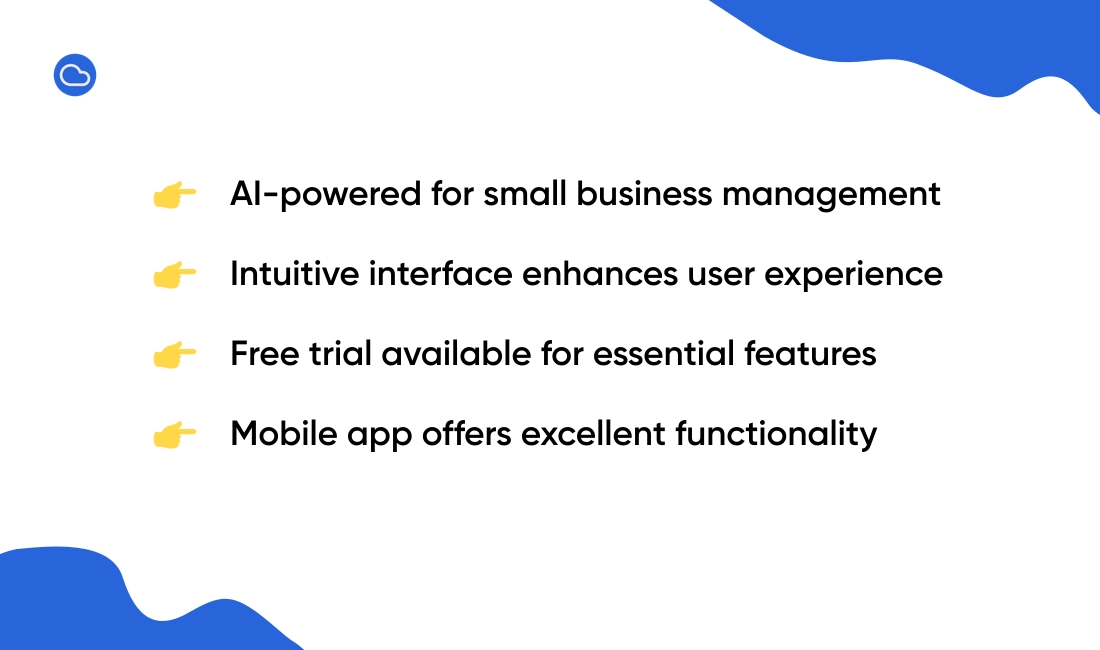
Bitrix24
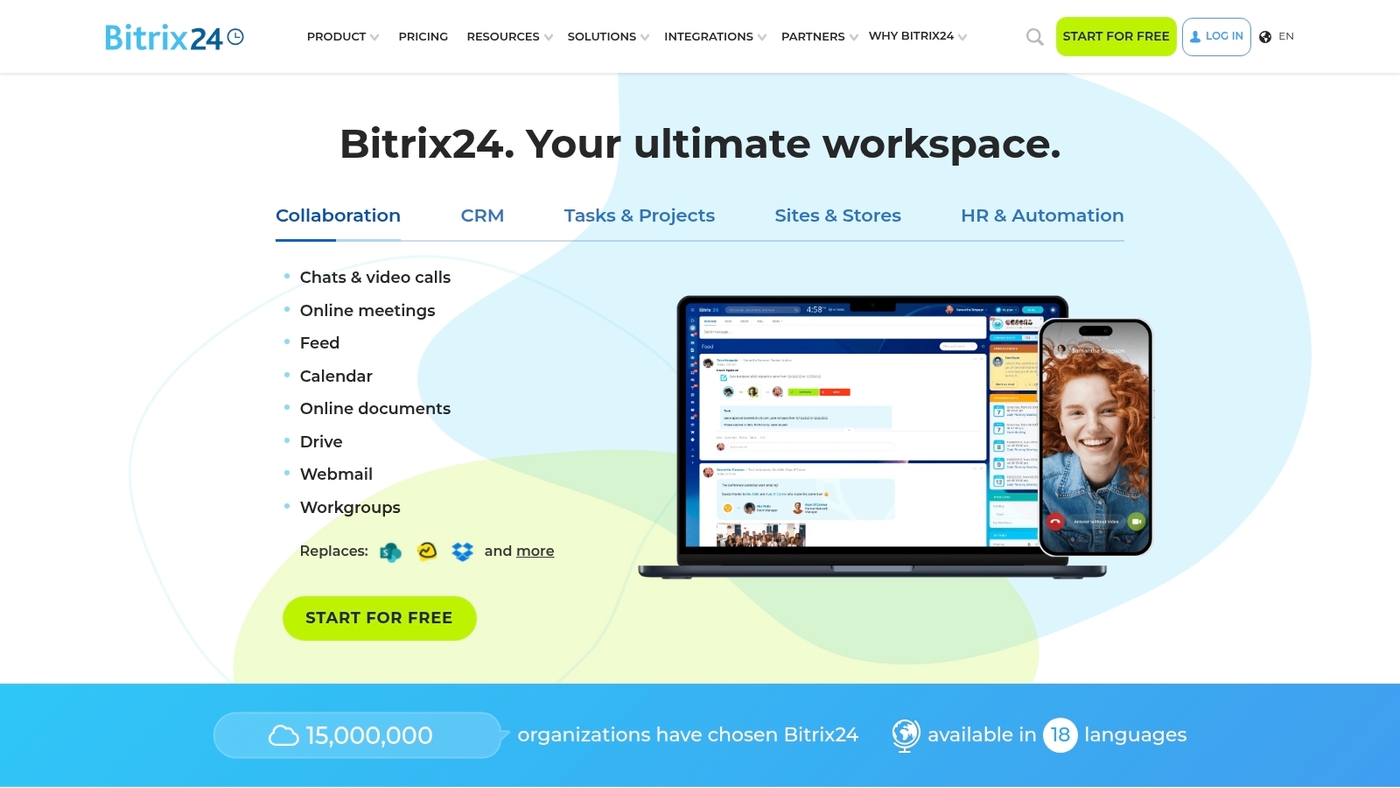
Bitrix24 stands out as a robust option for small businesses looking for a capable yet simple CRM tool.
With a comprehensive free plan supporting up to 12 users, it provides essential features like contact management, deal tracking, and project management.
The platform also integrates tools for internal communication, making it easier for teams to collaborate effectively.
I’ve seen how seamless this integration can enhance productivity.
Having all these features available without any cost helps small businesses manage their customer relationships more effectively.
It’s like having your office, communication tools, and CRM all rolled into one package.
Advantages
-
Free plan for up to 12 users
-
Integrated project management and communication tools
-
Built-in video conferencing and chat features
Disadvantages
-
Limited advanced customization options in the free plan
-
Some features may require paid upgrades
-
Interface can feel cluttered with so many features
For who?
Bitrix24 suits small businesses that need an all-in-one solution for managing customer relationships, internal projects, and team collaborations.
It’s particularly valuable for teams looking for a free tool that grows with their needs.
Price
The free plan offers many features suitable for small teams, while paid plans become necessary for businesses that require more users or advanced features.
EngageBay
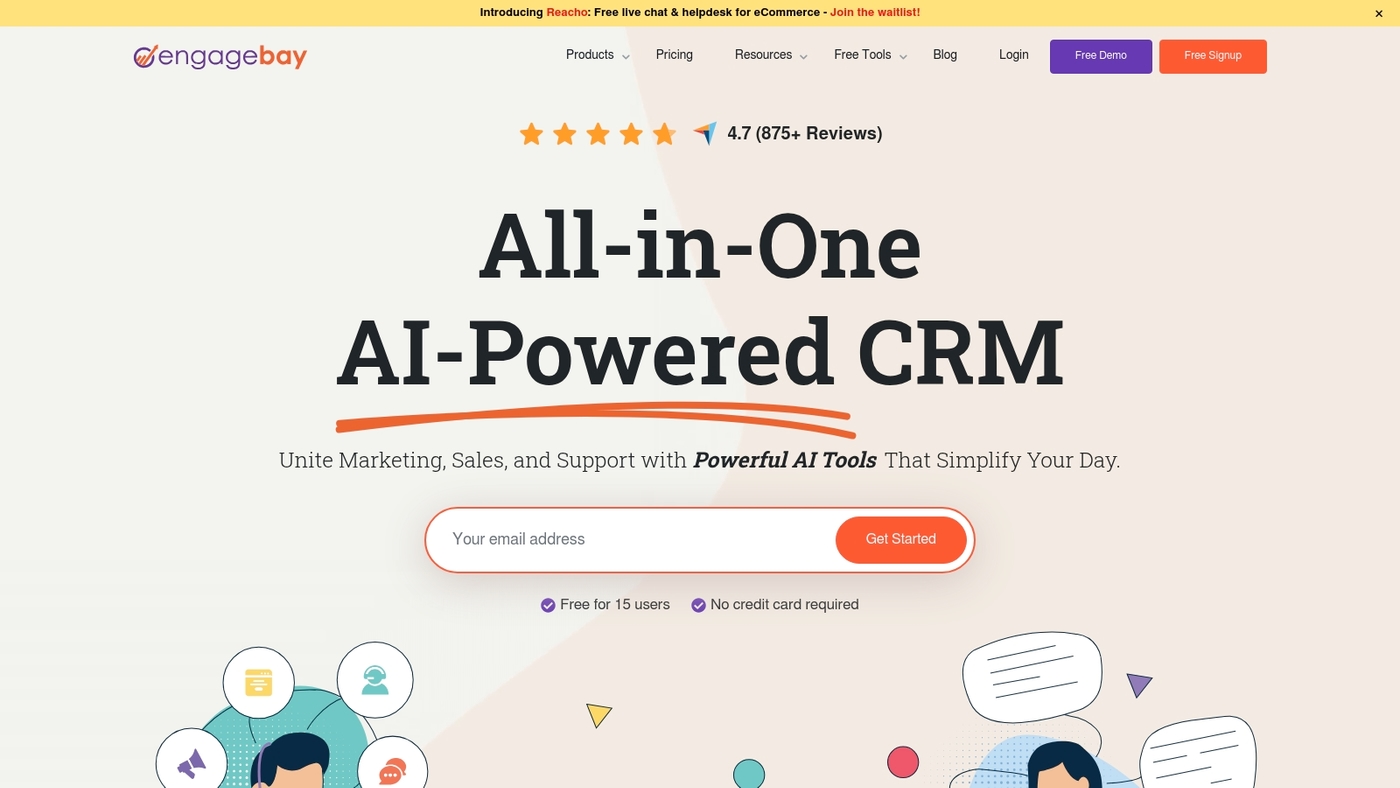
EngageBay serves as an all-in-one marketing, sales, and service simple CRM for small business, designed to support your team without overwhelming features.
The free plan allows for contact management, email marketing, and automation tailored for up to 1,000 contacts.
I’ve explored its functionality, and I appreciate how it melds various tools into one platform, making it easy for small businesses to manage their customer relationships efficiently.
You can dive straight into managing client interactions and automating tasks without steep learning curves or hidden costs.
Actually, what impressed me most was how smoothly the different modules work together—no more jumping between separate marketing and sales platforms!
Advantages
-
All-in-one platform that combines marketing, sales, and service functionalities
-
Generous free plan accommodating up to 1,000 contacts
-
Drag-and-drop email template builder
Disadvantages
-
Some advanced features may require upgrades
-
User interface could use enhancements for smoother navigation
-
Limited reporting in the free version
For who?
This tool is ideal for small businesses and startups that need a cohesive CRM solution without the hassle of juggling multiple tools.
It’s perfect for teams seeking to streamline their processes and enhance customer engagement.
Price
EngageBay offers a robust free plan. Paid plans start at around $12 per user monthly, providing additional features for growing businesses.
Agile CRM
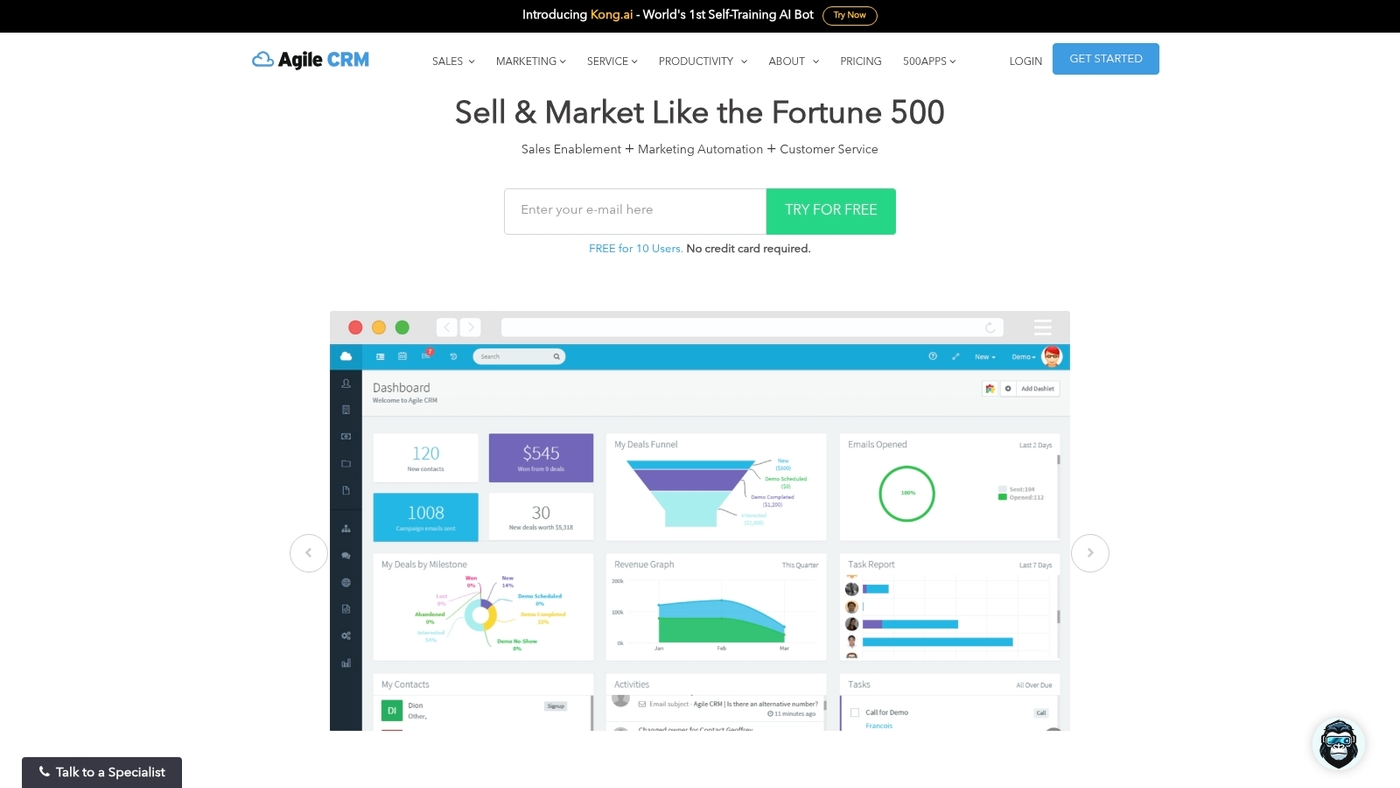
Agile CRM offers a free plan for up to 10 users, making it a solid choice for startups and micro-businesses.
This solution boasts features like contact management, deal tracking, email integration, and basic automation.
The user-friendly interface simplifies the customer relationship management process, allowing small businesses to efficiently organize crucial customer data and streamline operations.
I personally think that having such a straightforward tool can deeply impact the way small teams handle their customer interactions.
Agile CRM’s focus on essential features without overwhelming complexity makes it accessible for any user.
Pros
-
Free plan for up to 10 users
-
User-friendly interface with essential CRM features
-
Includes basic marketing automation tools
Cons
-
Limited advanced features compared to paid plans
-
Customization options may be restricted
-
Email marketing limited to 5,000 emails monthly
For who?
This CRM is ideal for startups and small businesses looking for an affordable and straightforward solution to manage customer relationships effectively.
Are you struggling to keep track of customer interactions across your small team? Agile CRM might be your answer.
Pricing
The free plan offers essential features, while paid plans start at competitive rates for businesses needing more advanced capabilities.
Capsule CRM
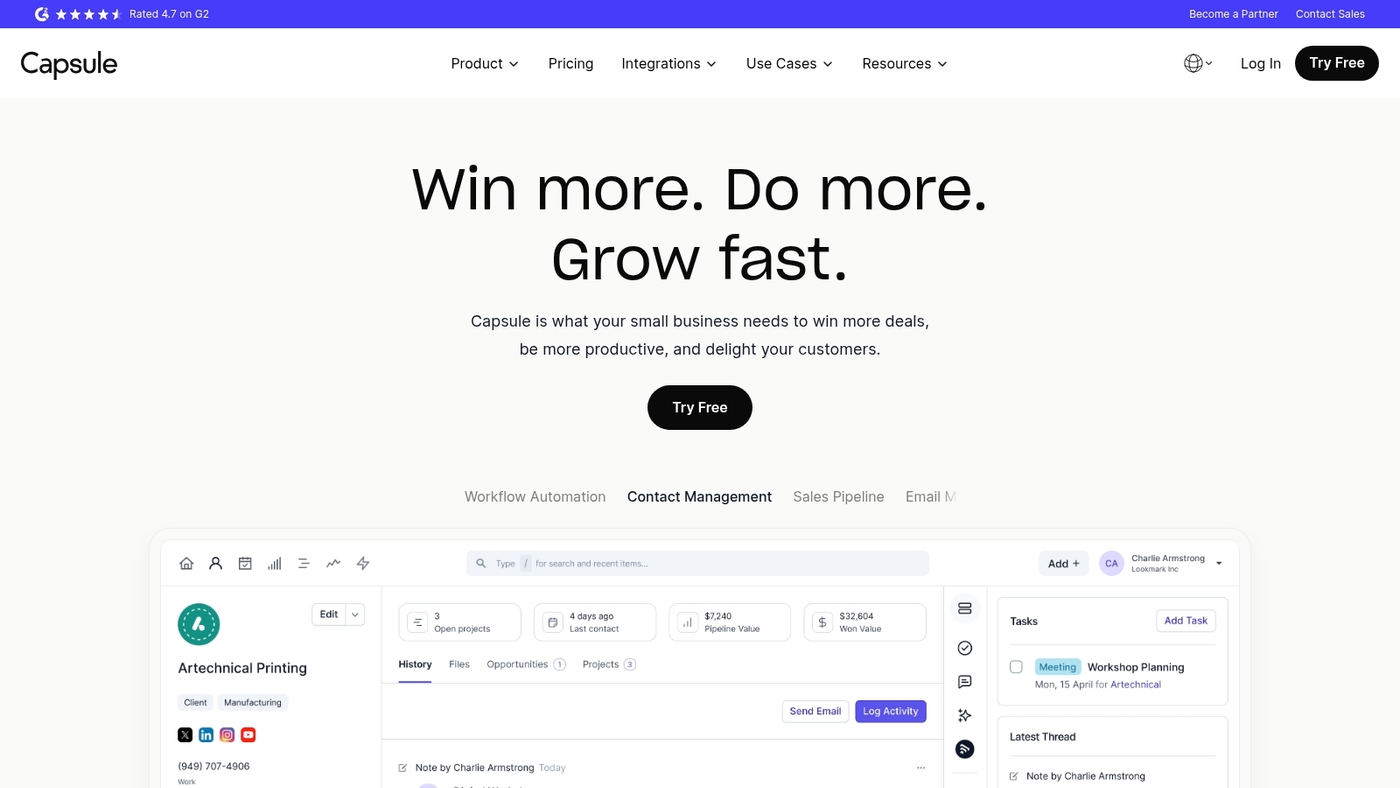
Capsule CRM offers a streamlined and user-friendly approach for managing customer relationships.
This software caters specifically to small businesses by providing a free plan for up to two users and handling 250 contacts.
Its design emphasizes simplicity, allowing you to manage core tasks like contact organization and task tracking effectively.
In my experience, the clean interface makes it easy to navigate, which helps in minimizing distractions and focusing on what truly matters — building customer relationships.
You won’t waste time figuring out complicated features you’ll never use.
Advantages
-
User-friendly interface that requires minimal training
-
Free plan supports two users, perfect for small teams
-
Focus on essential features like contact and task management
Disadvantages
-
Limited to two users in the free plan, which may not suffice for growing teams
-
Fewer advanced features compared to some competitors
-
250 contact limit can be restrictive
For who?
Capsule CRM suits small businesses, startups, and sole proprietors looking for a straightforward and effective CRM tool without the complexity of larger systems.
It’s particularly good for service businesses that need to track client interactions without getting lost in features.
Price
Capsule CRM offers a free plan for up to two users. For larger teams or additional features, paid plans start at around $18 per user monthly, allowing you to scale as your business grows.
Flowlu
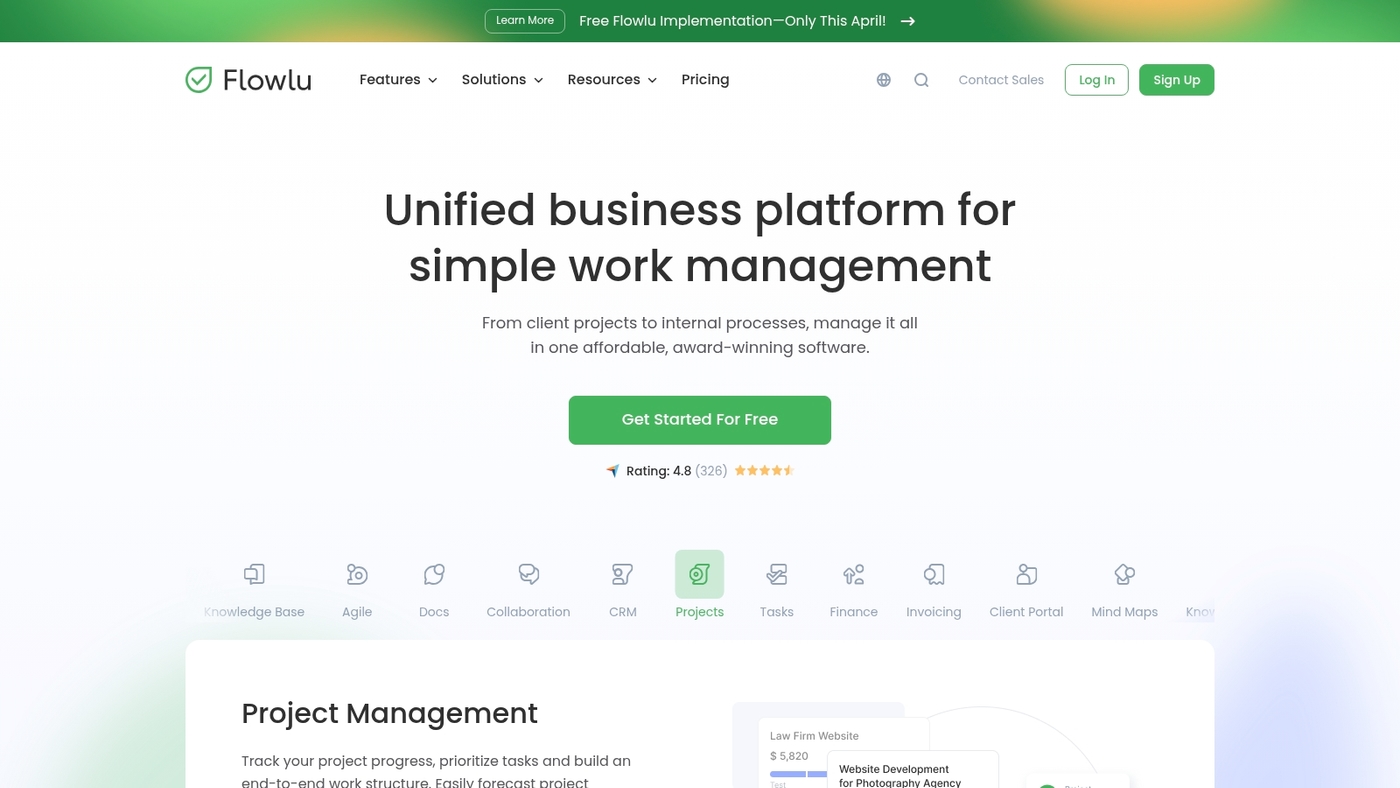
Flowlu is a cloud-based CRM designed specifically with small businesses in mind.
This software offers a free plan that includes essential features like lead management, sales funnels, and event tracking.
Flowlu excels in providing a user-friendly interface and robust functionality, making it particularly effective for service-based businesses.
I really appreciate how easy it is to navigate, allowing small teams to focus on building relationships rather than getting bogged down in complex processes.
I’ve been using Flowlu for a few months and find it has truly streamlined my customer interactions.
Pros
-
Free plan available for small businesses
-
User-friendly interface enhances productivity
-
Effective lead management and event tracking
-
Includes knowledge base functionality
Cons
-
Some advanced features are only available in paid plans
-
Limited customization options compared to other CRMs
-
Reporting features could be more robust
For who?
This CRM is perfect for service-based small businesses looking to enhance customer relationships without a significant financial investment.
It caters well to teams needing a straightforward tool to manage sales and leads, especially those who appreciate visual workflow management.
Pricing
Flowlu offers a free plan with essential features. Upgraded plans start at $39 monthly for 8 users, but check their website for the latest pricing details.
Streak
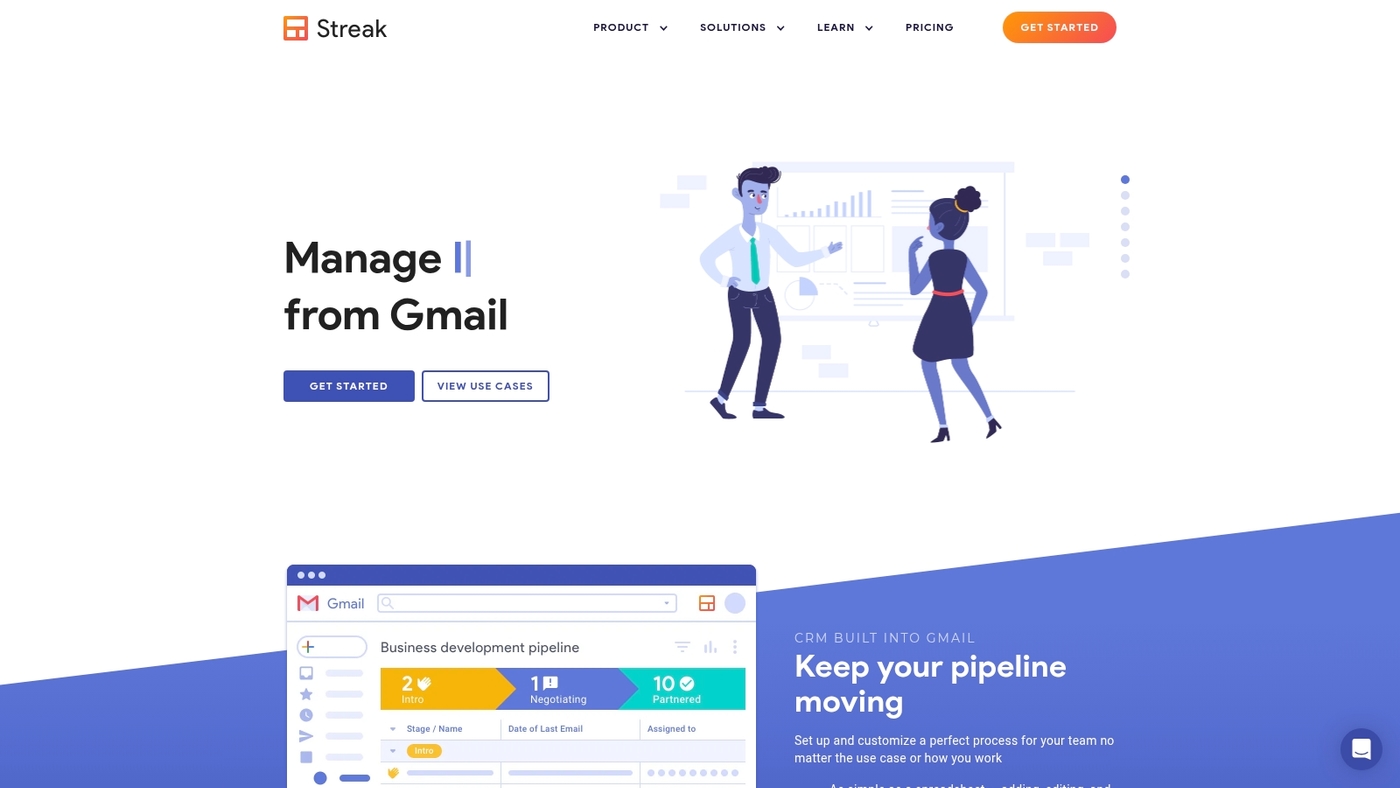
Streak serves as a unique Gmail-integrated CRM, making it an ideal choice for small businesses.
This tool allows you to manage customer relationships directly from your inbox.
The basic plan is free, ensuring you have access to essential features without the need for switching platforms.
With Streak, you can track email interactions, manage deals, and oversee customer communications easily.
I’ve found that the seamless integration it offers can truly enhance how you handle everyday customer interactions, simplifying the entire process.
It’s particularly handy if your team already lives in Gmail all day anyway.
Advantages
-
Gmail integration for easy customer relationship management
-
Free basic plan, ideal for small businesses
-
No platform switching needed—works where you already do
Disadvantages
-
Limited advanced features in the free version
-
May not suit teams who prefer comprehensive standalone software
-
Requires Chrome browser for full functionality
For who?
Streak is perfect for small businesses that regularly use Gmail and seek a simple CRM to integrate without additional costs.
Freelancers and solopreneurs will particularly appreciate its lightweight approach.
Price
The basic plan is free, making it very accessible for small businesses looking to manage customer relationships without initial costs.
Vtiger CRM
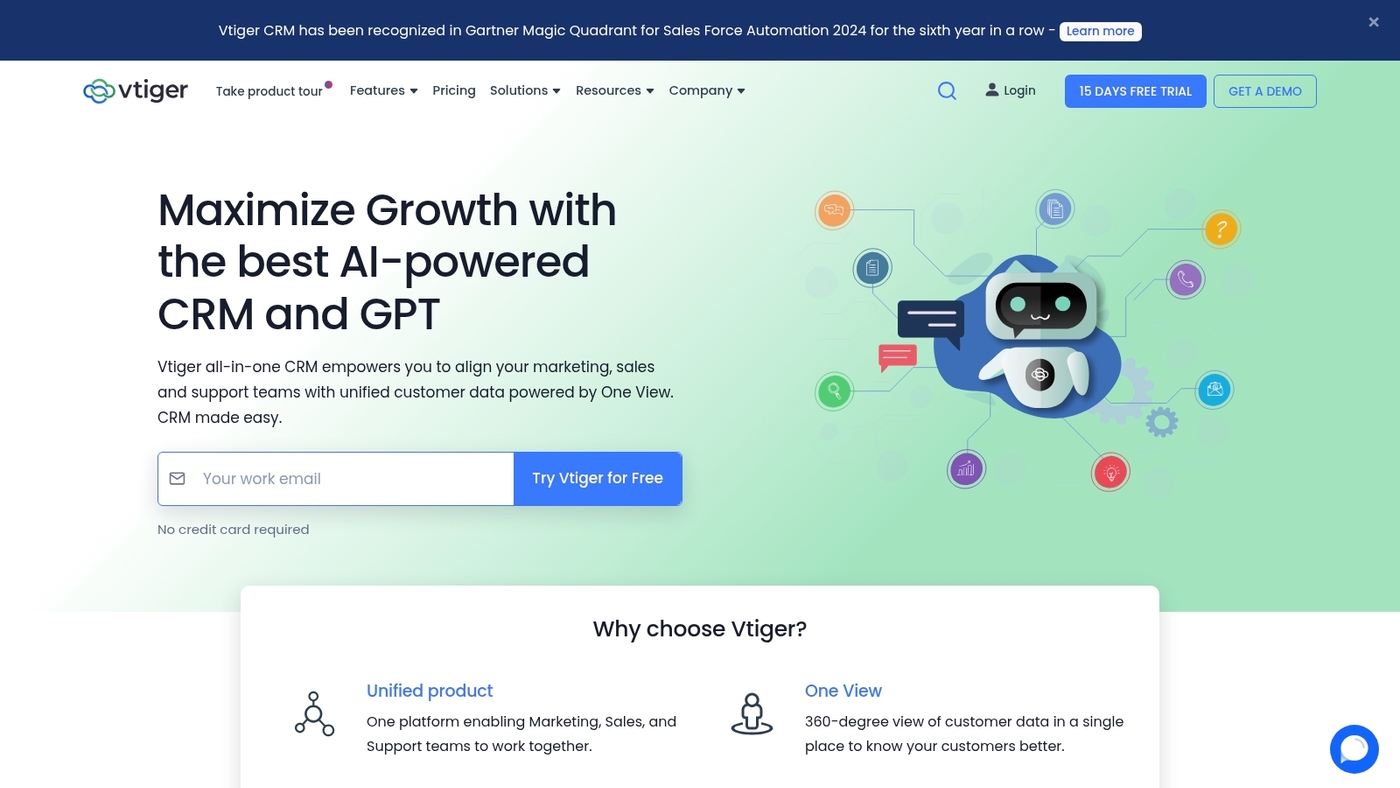
Vtiger CRM stands out as an open-source CRM with a free cloud edition designed for small teams.
This platform excels in sales automation, customer service, and marketing tools.
Customization options make it ideal for businesses looking to tailor solutions to their unique processes.
I’ve explored various CRM tools, and Vtiger’s adaptability and user-friendly interface truly enhance productivity.
For small businesses seeking a robust yet straightforward CRM, Vtiger presents a compelling option.
The open-source nature means you’re not locked into a proprietary system.
Advantages
-
Open-source flexibility for custom solutions
-
Free cloud edition with essential features
-
Strong email marketing capabilities
Disadvantages
-
May require technical expertise for advanced customization
-
Limited features in the free version compared to paid plans
-
Interface not as polished as some competitors
For who?
This CRM is perfect for small businesses and startups looking for an adaptable and cost-effective solution to manage customer relationships effectively.
It’s especially suitable for companies that value customization and open-source flexibility.
Price
Vtiger offers a free cloud edition, with paid plans available for additional features starting at competitive rates.
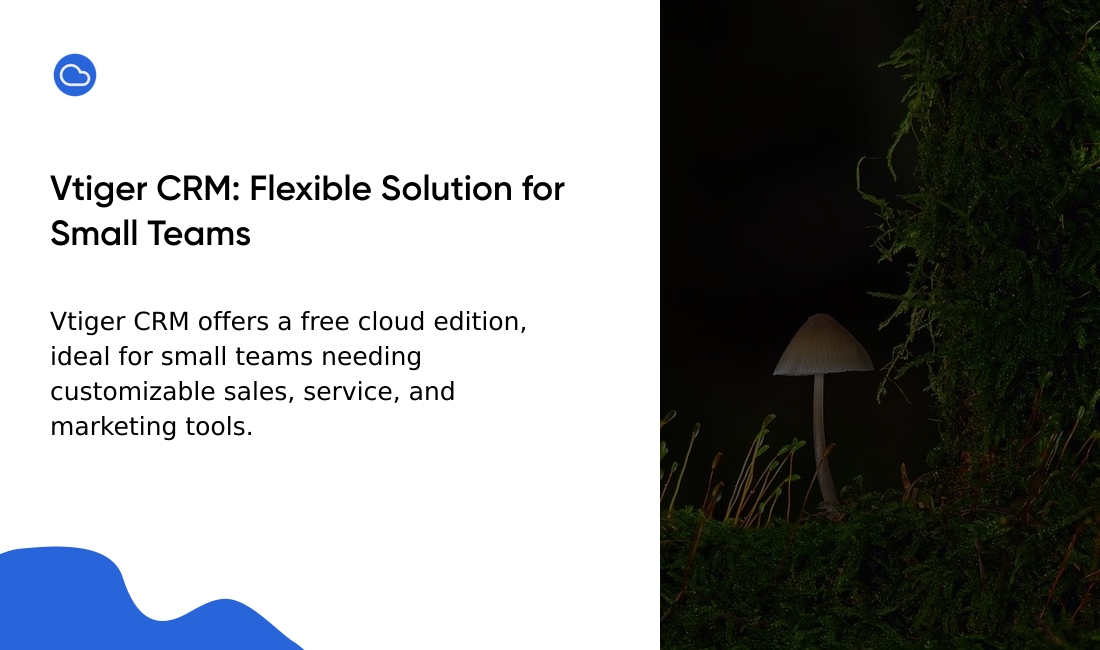
Cloud-Based vs. Self-Hosted CRM Solutions
Choosing the right CRM solution for your small business often revolves around two main types: cloud-based and self-hosted.
Each option has unique characteristics that can significantly impact your operations.
I’ve seen many businesses struggle with this decision, so let’s break down the key differences.
Cloud-based CRMs offer flexibility and ease of access.
You can reach your data from anywhere with an internet connection, which is a game-changer for remote teams or field sales staff.
Maintenance is mostly handled by the service provider, saving you time and technical headaches.
Security measures, often robust in these platforms, typically include data encryption and regular updates.
The subscription-based pricing model of cloud solutions aids cash flow management.
Rather than a large upfront investment, you pay manageable monthly fees.
This approach is ideal for small businesses that want to scale without heavy initial costs.
Plus, you’ll always have the latest version without worrying about updates.
On the flip side, self-hosted CRMs provide complete control over your data and customization options.
Businesses that handle sensitive information often prefer this approach since they maintain ownership of their data and can implement specific security protocols.
But let’s be real—this control comes with responsibility.
Self-hosted solutions require technical expertise for maintenance, security, and updates.
You’ll need either in-house IT support or a reliable service provider.
Costs can vary significantly when considering hardware, software, and ongoing maintenance expenses.
It’s like owning a car versus using a ride-sharing service—ownership gives control but adds responsibility.
When making this choice, honestly assess your business’s specific needs and resources.
How often does your team need remote access to the CRM?
Consider your level of technical expertise and how crucial data security is for your industry.
Balancing these aspects will guide you toward the right solution for your unique situation.
How to Maximize Value from Free CRM Tools
Free CRM tools offer flexibility and accessibility for small businesses.
To truly get the most from these services, consider implementing a few straightforward strategies.
Start with establishing clear goals for your CRM usage.
Knowing what you want the software to accomplish allows you to optimize its features effectively.
Are you focusing on lead generation, customer retention, or streamlining communication?
Your specific objectives will guide how you configure and use the system.
Data management plays a significant role in maximizing CRM value.
Regularly clean your database to ensure accuracy—remove duplicates, update contact information, and standardize entry formats.
This practice enhances segmentation and targeting capabilities, making your communication more effective.
I’ve seen a noticeable difference in engagement simply by maintaining organized and up-to-date customer information.
Another important aspect involves training your team properly.
Even the best CRM functions poorly without proper user understanding.
Encourage your team to explore features and utilize them to enhance workflows.
This empowerment often leads to increased productivity and user satisfaction.
-
Create standardized data entry protocols
-
Schedule regular data cleaning sessions
-
Develop simple training materials for new team members
-
Review CRM usage analytics to identify improvement areas
When evaluating the efficacy of your free CRM, keep an eye on your growing needs.
Small businesses often face growth spurts that change their requirements.
A tool that meets your current needs may fall short later.
If your customer base expands or you require additional advanced features, it might be time to consider upgrading to paid plans.
Just remember, embracing simplicity and staying organized can help you unlock the full potential of your CRM tool.
The most successful implementations focus on consistent usage rather than utilizing every available feature.

